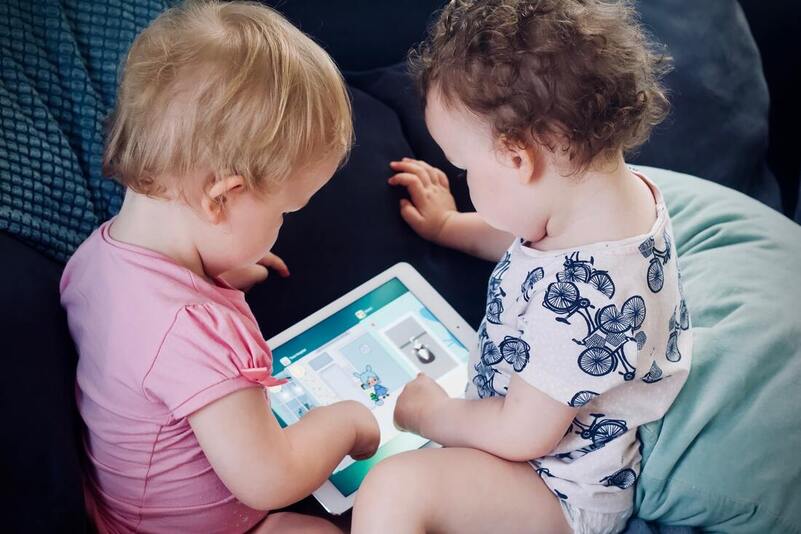Toddlers and Technology: Tantrums in the Digital Age
At a restaurant, a grocery store, or a park, more often than not, parents soothe their crying toddlers with electronic devices. In the age of digital media, it comes as no surprise that caregivers frequently use a tablet or smartphone to entertain unhappy children. It distracts the child from their unhappy emotions and allows the adult to continue what they are doing. However, researchers at the School of Family Life at Brigham Young University decided to look more closely into this common phenomenon in order to determine its possible causes and negative effects.
In a study published in March of 2021, the researchers wanted to determine the relationships between toddler temperament, parents’ use of electronic devices as an emotional regulator for their children, and toddlers’ reactions to having their devices taken away from them. They selected a group of caregivers for 269 toddlers before using self-surveying and observation to collect their data. To assess toddler temperament, the researchers prompted the parents with the Early Childhood Behavior Questionnaire Short Form (ECBQ-SF), which is commonly used to measure aspects of child temperament like extraversion and negative affect. To investigate the possibility of problematic media use or the use of electronic devices as a way of calming an upset child, the parents responded to the Problematic Media Use Measure Short Form (PMUM-SF). This questionnaire measures aspects of media interference that are typically associated with addiction, such as a child's loss of interest in other activities, obsession with media, withdrawal effects, tolerance, and other states. Finally, to evaluate emotional reactivity to the removal of media, the researchers presented the toddlers with a clip that unexpectedly ended mid-episode of a popular television show. The researchers noted any physical manifestations indicative of a negative reaction, such as crying and distressed facial expressions.
In a study published in March of 2021, the researchers wanted to determine the relationships between toddler temperament, parents’ use of electronic devices as an emotional regulator for their children, and toddlers’ reactions to having their devices taken away from them. They selected a group of caregivers for 269 toddlers before using self-surveying and observation to collect their data. To assess toddler temperament, the researchers prompted the parents with the Early Childhood Behavior Questionnaire Short Form (ECBQ-SF), which is commonly used to measure aspects of child temperament like extraversion and negative affect. To investigate the possibility of problematic media use or the use of electronic devices as a way of calming an upset child, the parents responded to the Problematic Media Use Measure Short Form (PMUM-SF). This questionnaire measures aspects of media interference that are typically associated with addiction, such as a child's loss of interest in other activities, obsession with media, withdrawal effects, tolerance, and other states. Finally, to evaluate emotional reactivity to the removal of media, the researchers presented the toddlers with a clip that unexpectedly ended mid-episode of a popular television show. The researchers noted any physical manifestations indicative of a negative reaction, such as crying and distressed facial expressions.
Image Source: zhenzhong liu
From the collected data, the researchers concluded that toddlers with difficult temperaments are given media to regulate their emotions more often than toddlers with easy temperaments. They hypothesized that parents frequently make use of digital media because it can quickly and effectively calm a child in the midst of a tantrum. Furthermore, it was observed that toddlers with difficult temperaments had problematic media use, meaning they responded poorly to the removal of media. Similarly, the researchers found that the children of parents who used media emotion regulation more often tended to respond with extreme emotion when media was taken away from them.
Although this study has some limitations, like the fact that much of the data was self-reported by the parents and that it was a cross-sectional study rather than a longitudinal one, it still highlights what has become a prevalent phenomenon in the digital age: Parents, especially those of toddlers with difficult temperaments, tend to frequently use electronic devices to soothe tantrums and outbursts. Although this has become very common, researchers are concerned about the potential negative effects of this habit. Through this tendency, parents may be unintentionally preventing their children from developing emotional regulation skills, learning instead to rely on devices to distract themselves from unpleasant emotions. Similarly, this practice may cause toddlers to become emotionally dependent on media at all times, which may lead to the development of addictions and other unhealthy coping mechanisms as the child ages. With this in mind, parents may reconsider handing a crying toddler an electronic device, possibly creating a better future at the cost of a slightly less peaceful present.
Although this study has some limitations, like the fact that much of the data was self-reported by the parents and that it was a cross-sectional study rather than a longitudinal one, it still highlights what has become a prevalent phenomenon in the digital age: Parents, especially those of toddlers with difficult temperaments, tend to frequently use electronic devices to soothe tantrums and outbursts. Although this has become very common, researchers are concerned about the potential negative effects of this habit. Through this tendency, parents may be unintentionally preventing their children from developing emotional regulation skills, learning instead to rely on devices to distract themselves from unpleasant emotions. Similarly, this practice may cause toddlers to become emotionally dependent on media at all times, which may lead to the development of addictions and other unhealthy coping mechanisms as the child ages. With this in mind, parents may reconsider handing a crying toddler an electronic device, possibly creating a better future at the cost of a slightly less peaceful present.
Featured Image Source: Jelleke Vanooteghem
RELATED ARTICLES
|
Vertical Divider
|
Vertical Divider
|
Vertical Divider
|






